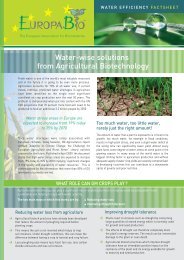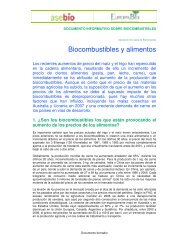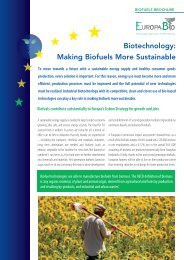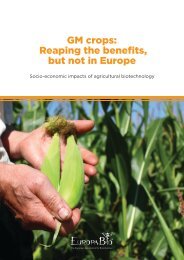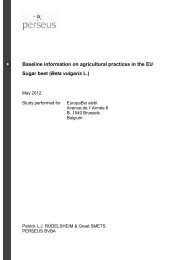A vision for 2030 and beyond - Europa
A vision for 2030 and beyond - Europa
A vision for 2030 and beyond - Europa
You also want an ePaper? Increase the reach of your titles
YUMPU automatically turns print PDFs into web optimized ePapers that Google loves.
4 BIOFUELS IN THE EUROPEAN UNION • A VISION FOR <strong>2030</strong> AND BEYOND<br />
2 Actual situation<br />
© Alex<strong>and</strong>er M. Omelko<br />
Biofuels will mostly be used in gasoline- <strong>and</strong><br />
diesel-type internal combustion engines.<br />
However it is possible that specialised engines<br />
will be used in certain applications or in<br />
dedicated fleets. The majority of engines<br />
available in <strong>2030</strong> will require liquid fuels,<br />
although their molecular composition might have<br />
evolved from today’s fuels. It will be beneficial if<br />
the new fuels are similar to, or at least<br />
compatible with, today’s fuel types <strong>and</strong><br />
specifications. Ability to mix fuels from<br />
alternative sources with current, conventional<br />
fuels without jeopardising the st<strong>and</strong>ard fuel<br />
specifications, <strong>and</strong> making use of existing<br />
infrastructure, is a very effective means <strong>for</strong> the<br />
implementation of these fuels.<br />
Thus, the challenge is to increase substantially the<br />
production of biofuels that are commercially viable,<br />
CO2-efficient <strong>and</strong> compatible with vehicle engines,<br />
by using innovative processes <strong>and</strong> technologies. To<br />
achieve this, it will be necessary, while supporting<br />
the implementation of currently available biofuels,<br />
to promote the transition towards “second<br />
generation biofuels”, which will be produced from<br />
a wider range of feedstock (including waste<br />
biomass), reduce competition <strong>for</strong> l<strong>and</strong> <strong>and</strong> food,<br />
<strong>and</strong> which will help to reduce costs of “saved” CO2.<br />
To ensure the reduction of CO2 emissions, a market<br />
mechanism will be required to ensure that<br />
CO2-efficiency of bio-fuels is acknowledged<br />
<strong>and</strong> rewarded. Mechanisms (e.g. a certification<br />
scheme) could be used to promote the production<br />
<strong>and</strong> use of “more CO2-effective” biofuels.<br />
© UFOP e.V.<br />
Research <strong>and</strong> development are paramount in<br />
reaching the <strong>vision</strong>. A phased development is<br />
envisaged based on short-term improvement of<br />
existing feedstock <strong>and</strong> technologies, RTD&D<br />
(research, technology development <strong>and</strong><br />
demonstration) <strong>and</strong> commercial production of<br />
2 nd generation biofuels (mainly from lignocellulosic<br />
biomass), RTD&D <strong>and</strong> implementation of full-scale<br />
integrated biorefineries, <strong>and</strong> new energy crops.<br />
For supply of the biomass feedstock, sustainable<br />
l<strong>and</strong> strategies must be created that are<br />
compatible with the climatic, environmental <strong>and</strong><br />
socio-economic conditions prevailing in each<br />
region. The production <strong>and</strong> use of both the primary<br />
<strong>and</strong> residual <strong>for</strong>ms from agricultural, <strong>for</strong>estry <strong>and</strong><br />
industrial operations should be promoted.<br />
Research on improving crop yields <strong>and</strong> energy<br />
input/output, as well as key quality characteristics<br />
using advanced technologies, should be taken<br />
carefully into account.<br />
The expected growth of the biofuels market <strong>and</strong><br />
the development of new trans<strong>for</strong>mation pathways<br />
make it timely to investigate new integrated<br />
refining schemes. The co-production of fuels, heat<br />
& power <strong>and</strong> co-products in integrated<br />
biorefineries will enhance the overall economy <strong>and</strong><br />
competitiveness of biofuels. The biorefineries will<br />
be characterised by an efficient integration of<br />
various steps, from h<strong>and</strong>ling <strong>and</strong> processing of<br />
biomass, fermentation in bioreactors, chemical<br />
processing, to final recovery <strong>and</strong> purification of the<br />
product.




